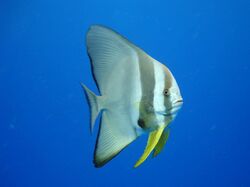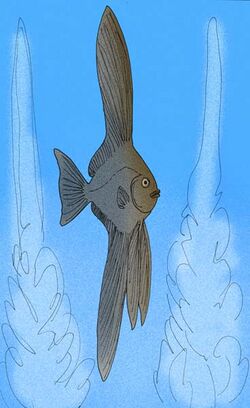Biology:Platax
| Platax | |
|---|---|

| |
| Platax teira | |
| Scientific classification | |
| Domain: | Eukaryota |
| Kingdom: | Animalia |
| Phylum: | Chordata |
| Class: | Actinopterygii |
| Order: | Moroniformes |
| Family: | Ephippidae |
| Genus: | Platax G. Cuvier, 1816 |
| Type species | |
| Chaetodon teira Bloch & J. G. Schneider, 1801
| |
| Species | |
|
See text | |
Platax is a genus of Indo-Pacific, reef-associated fish belonging to the family Ephippidae.[1] There are currently five known extant species generally accepted to belong to the genus.[2] They are one of the fish taxa commonly known as "batfish".
Description
Members of the genus Platax are generally similar in shape to the other species in the family. Adults are rather disc-shaped fish, with laterally compressed bodies and large dorsal and anal fins that give individuals a somewhat triangular profile. Platax teira is the largest species, reaching lengths of around 70 centimetres (28 in).[3] The other species reach maximum lengths of around 40–65 cm (16–26 in).[1]
Distribution
Platax can be found in reefs throughout the entire Indo-Pacific region. Their range extends from the western Indian Ocean in the Red Sea to as far east as Australia . Most Platax species can be found in higher latitudes, as high as the Ryukyu Islands in Japan and as far south as the eastern coast of Australia.[4] However, the ranges of the individual species is not consistent throughout the genus' range. Platax pinnatus for example is most likely not found in the Indian Ocean.[1] A few individuals have been found in Atlantic waters. Apparently, the species Platax orbicularis has been observed in Florida waters as a non-native, invasive species. The aquarium industry has been blamed for the spread of this species into the Caribbean.[5]
Members of the genus are most common around reefs and shipwrecks.[4]
Taxonomy
The genus was first used by Cuvier with the publication of his 1816 system of animal classification. He assigned the genus to the batfish species Platax boersii, a classification which still holds to this day. Another species to be assigned to the genus by Cuvier was Platax ocellatus, a butterflyfish that is now more correctly classified in the genus Chaetodon in Chaetodontidae. In the same work, a species that is now known to belong to the genus, Platax teira was classified by Cuvier in a different genus, Chaetodon teira.[6]
A few species have been assigned to the genus that have since been reclassified into other genera. The butterflyfish, C. ocellatus mentioned above is one of these species. Another species that has been mistakenly classified as a Platax is the common freshwater angelfish, Pterophyllum scalare. In a joint effort with Valenciennes, Cuvier published a natural history work in 1831 where the freshwater angelfish was classified as Platax scalaris.[7] The freshwater angelfish, of course is not as closely related to the marine batfish as to warrant classification in the same genus.[8] A more scientifically acceptable mis-classification would be that of the species Zabidius novemaculeatus. This species was first described as Platax novemaculeatus by Mcculloch when it was discovered from Australia in the early 1900s.[9] The species is now classified in the genus Zabidius, which is still in the same family as the genus Platax.[10]
The generic name, "platax" was coined from the Greek term platys - meaning "flat". This refers to the generally compressed body shape of the fish. They are commonly called "batfish".[1] However, they are not the only fish taxon called by this name. Fish from the only distantly related family Ogcocephalidae are also commonly known as "batfish".[11] Other families with species that have been referred to as "batfish" include the families Dactylopteridae,[12] Drepaneidae,[13] Monacanthidae,[14] and Monodactylidae.[15]
Species
There are currently five recognized species in this genus:[16]
- Platax batavianus G. Cuvier, 1831 (Humpback batfish)
- Platax boersii Bleeker, 1852 (Golden spadefish)
- Platax orbicularis (Forsskål, 1775) (Orbicular batfish)
- Platax pinnatus (Linnaeus, 1758) (Dusky batfish)
- Platax teira (Forsskål, 1775) (Longfin batfish)
There are also at least four fossil species known:[17]
- †Platax altissimus Agassiz, 1842
- †Platax macropterygious Agassiz, 1842
- †Platax papilio Agassiz, 1842
- †Platax woodwardii Agassiz, 1842
References
- ↑ 1.0 1.1 1.2 1.3 Froese, Rainer and Pauly, Daniel, eds. (2009). Species of Platax in FishBase. January 2009 version.
- ↑ "Platax Cuvier, 1816". Integrated Taxonomic Information System. https://www.itis.gov/servlet/SingleRpt/SingleRpt?search_topic=TSN&search_value=169541. Retrieved 14 January 2009.
- ↑ Randall, J. E. (1995). Coastal fish of Oman. Honolulu, Hawaii: University of Hawaii Press. pp. 439.
- ↑ 4.0 4.1 Myers, R. F. (1991). Micronesian reef fish (2nd ed.). Barrigada, Guam: Coral Graphics. pp. 298.
- ↑ Pickrell, John (2004-06-01). "Freed pet fish threaten native species, study says". National Geographic News (National Geographic). http://news.nationalgeographic.com/news/2004/05/0520_040520_aquariumescapees.html. Retrieved 2009-01-13.
- ↑ Cuvier, Georges (1816). Le Règne Animal distribué d'après son organisation pour servir de base à l'histoire naturelle des animaux et d'introduction à l'anatomie comparée. Les reptiles, les poissons, les mollusques et les annélides. Règne Animal (ed. 1) i-xviii (1st ed.). pp. 532.
- ↑ Cuvier, Georges; A. Valenciennes (April 1831). Histoire naturelle des poissons. Tome septième. Livre septième. Des Squamipennes. Livre huitième. Des poissons à pharyngiens labyrinthiformes. Historie naturelle des poissons. 7: i-xxix. pp. 531.
- ↑ Kullander, S. O. (1986). Cichlid fish of the Amazon River drainage of Peru. Stockholm, Sweden: Department of Vertebrate Zoology, Research Division, Swedish Museum of Natural History. pp. 394.
- ↑ McCulloch, A. R. (1916-10-31). Report on some fish obtained by the F. I. S. "Endeavour" on the coasts of Queensland, New South Wales, Victoria, Tasmania, South and South-Western Australia. Part IV. Biological Results Endeavour. 4. pp. 169–199.
- ↑ Allen, Gerard R.; R. Swainston (1988). The marine fish of north-western Australia: a field guide for anglers and divers. Perth, Australia: Western Australian Museum. pp. 201.
- ↑ Froese, Rainer, and Daniel Pauly, eds. (2009). "Ogcocephalidae" in FishBase. January 2009 version.
- ↑ Froese, Rainer and Pauly, Daniel, eds. (2009). "Dactylopterus volitans" in FishBase. January 2009 version.
- ↑ Froese, Rainer and Pauly, Daniel, eds. (2009). "Drepane punctata" in FishBase. January 2009 version.
- ↑ Froese, Rainer and Pauly, Daniel, eds. (2009). "Aluterus monoceros" in FishBase. January 2009 version.
- ↑ Froese, Rainer and Pauly, Daniel, eds. (2009). "Monodactylus argentus" in FishBase. January 2009 version.
- ↑ Froese, Rainer and Pauly, Daniel, eds. (2013). Species of Platax in FishBase. April 2013 version.
- ↑ Paleobiology Database
External links
Wikidata ☰ Q1425409 entry
 |


